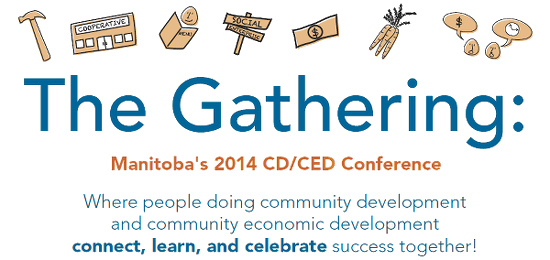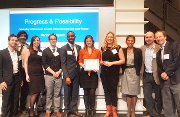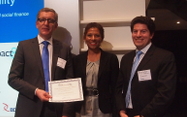|
||||||||||||||||||||||||||
|
||||||||||||||||||||||||||
 This blog is part of the ‘Voices of New Economies’ series within Cities for People – an experiment in advancing the movement toward urban resilience and livability through connecting innovation networks. This Voices series is collectively curated by One Earth and The Canadian CED Network. We are launching Voices of New Economies as part of New Economy Week 2014, hosted by the New Economy Coalition. Throughout this week, a series of 5 questions guide our exploration of what it would take to build the economy we need – one that works for people, place, and planet.
This blog is part of the ‘Voices of New Economies’ series within Cities for People – an experiment in advancing the movement toward urban resilience and livability through connecting innovation networks. This Voices series is collectively curated by One Earth and The Canadian CED Network. We are launching Voices of New Economies as part of New Economy Week 2014, hosted by the New Economy Coalition. Throughout this week, a series of 5 questions guide our exploration of what it would take to build the economy we need – one that works for people, place, and planet.
Today’s Voices story responds to the fifth and final question in the New Economy Week series: How can we support neighborhoods, cities, towns, and regions as the fertile ground for the kind of economy we need?
By Nabeel Ahmed
When Sean Geobey was in university, he helped start up a community capacity building nonprofit. It introduced him to the challenges of how social service organizations financed their work, a question he has grappled with in his doctoral research at the University of Waterloo and the Waterloo Institute of Social Innovation and Resilience. His work on social finance looks at alternative funding models and how they can transform the social sector, private markets, and governments that encourage more inclusive, democratic, and real-wealth creating activities.
For Sean, real wealth comes from the things that allow us to better express ourselves; things that allow for individual talents and interests to flourish in a way that doesn’t harm other people’s capacity to do the same. That wealth comes from our capacity to invest materially, socially, and intellectually in the creation of institutions and infrastructure that support collective efforts to try and make the world a better place
What are some key elements of new economies?
It’s important, here, to take stock of the new economies we are drifting into and guide them towards the new economies we desire (which may have elements of the ‘old’ economies as well).
Increasingly, real wealth is being diminished by the commodification of human inputs and creativity. This is a world of increased automation, designed more by bits and data rather than the creation of actual goods and services. It is a globalized world, not just economically but also socially and culturally. There has been a troubling shift towards institutions that are fundamentally unaccountable to the general public and community; corporate actors that act with impunity across borders present a real challenge for the remaining democratic institutions to channel productive capacity towards broader positive impacts rather than just shareholders.
Despite the discontents, more flexibility does hold an incredible amount of promise, and technological advances can increase material well-being and creative potential.
Ultimately, new, resilient economies that better serve people will require a revitalization of democratic people-controlled institutions, from governments, to finance, to worker organizations, to company ownership and control. It means a better understanding of local environments and the increasing variety of people in them, learning from past institutions while creating new ones, in ways that can leverage advances in technology.
How can we support neighborhoods, cities, towns, and regions as the fertile ground for the kind of economy we need?
At the local level, we have a real opportunity to revive and modernize this idea of a mutual aid driven society that was prevalent in the late 19th century. This includes the credit union sector, cooperatives, and craft unions, creating opportunities for people to support each other’s work around the world. Such organizations can maintain autonomy while working together at a global scale, which large multinational corporations and the financial sector do quite well, but older models of mutual aid have historically struggled with.
This is where social finance comes in. Just as the prevalence of sophisticated, globalized financial tools has helped the modern economy develop, a more human-oriented way of social, economic, and ecological prosperity can come from getting regular people engaged with finance to help develop their own communities and support the work of like-minded people wherever they may be.
The credit union sector, for example, has been pushing for innovation in local economic development through various means, including the creation of community bonds. These are small investments created by nonprofits and social sector organizations, mostly administered by credit unions, that allow organizations without traditional access to debt financing to convert erstwhile donors into more substantial supporters in the form of a loan. This allows social sector organizations with real capital and assets to leverage value in a way they have not been able to do so previously.
Crowdfunding is the most obvious technology-driven social finance innovation, emerging in the last decade to allow an unprecedented global flow of capital from ordinary people. It has been particularly transformative in turning retail consumers into financiers; in the entertainment, music, film and video game industries, the pre-purchase model has allowed new people to produce interesting ideas and tell new stories that were impossible a few decades ago. As a pre-purchaser, you effectively give a loan to a producer, which completely changes the relationship between consumers and producers.
Through tapping into both local and global social finance tools, individuals can transform institutions to be more inclusive of people’s creativity and fundamental dignity.
Sean Geobey is currently a McConnell Fellow with SiG@Waterloo and pursuing a PhD in Management Sciences at the University of Waterloo. Sean Geobey has worked in policy, program development and research positions in a variety of organizations including the BC Ministry of Health Services, Sustainable Waterloo, and the Laurier Students’ Public Interest Research Group. He continues to provide strategic planning and facilitation workshops, serves on the National Council of Fair Vote Canada, and is developing participatory and experience-based adult education models. Currently his research focuses on how to integrate different perspectives in group decision-making, an approach which has concrete applications in social finance, policy development and resource-allocation within coalitions.
 This blog is part of the ‘Voices of New Economies’ series within Cities for People – an experiment in advancing the movement toward urban resilience and livability through connecting innovation networks. This Voices series is collectively curated by One Earth and The Canadian CED Network. We are launching Voices of New Economies as part of New Economy Week 2014, hosted by the New Economy Coalition. Throughout this week, a series of 5 questions guide our exploration of what it would take to build the economy we need – one that works for people, place, and planet.
This blog is part of the ‘Voices of New Economies’ series within Cities for People – an experiment in advancing the movement toward urban resilience and livability through connecting innovation networks. This Voices series is collectively curated by One Earth and The Canadian CED Network. We are launching Voices of New Economies as part of New Economy Week 2014, hosted by the New Economy Coalition. Throughout this week, a series of 5 questions guide our exploration of what it would take to build the economy we need – one that works for people, place, and planet.
Today’s Voices story responds to the third question in the New Economy Week series: How do we transition to a renewable economy without leaving the workers, young people, and communities most impacted by extractive industries behind?
When I envision New Economies…
I see engaged citizens with equal voices being the stewards of their communities and their world.
I see companies and organizations having their decisions made by the people who utilize and are impacted by them.
I see the urge to participate in new economies as second nature because the connection to each other and the planet is evident.
I see responsible consumerism because we are informed and educated in our decisions. Transparency is the norm not an exception.
I see values-based economies where collaboration is prominent and the goal is striving to be better for all not for one.
I see long-term thinking for the generations ahead.
Real wealth to me is not getting as big as we can as fast as we can as a society, but rather getting to where we need to be without leaving anyone behind. It’s a shift from viewing others through the lens that life is a competition and success is rated by our job title, what is in our bank account, and what is in our garage. Real wealth means I am engaged in my work because it aligns with my values, that nature isn’t just something that appears when I leave city limits, and that I care about the person I pass on the street. Instead, I recognize it’s not a situation of more for you is less for me, but that equality means we are all wealthier in the long run.
How do we achieve these new economies where we don’t leave others behind? I firmly believe a key component is engaged citizens through democratic self-governance.
Yes, the democratic process can mean decisions can take more time, but I can tell you through my experience working within a financial co-operative that those decisions are different. They are grounded in the people who are impacted by them, and are stronger decisions for this reason. They reflect the needs of the members because they are made by the members.
When we look at our systems in place today, even within democratic governance, we need to improve in ensuring that those who are contributing towards the decisions reflect the population. We know youth are our future therefore investments to educate, mentor, and most importantly to ensure they are contributing to the decisions of today are invaluable. The Co-operators and the Canadian Community Economic Development Network (CCEDNet) are both committed to giving youth, including myself over the last few years, the opportunity to be included and shape the world of tomorrow.
To continue the momentum of New Economy Week I urge you regardless of age to become involved with organizations such as The Co-operators and CCEDNet and spread the word to others to ensure our new economy is one that includes each and every one of us.
https://www.youtube.com/watch?v=DdZ5jLm8EqI (2014 Impact! Sustainability Conference)
 Marianne Jurzyniec is a Governance Liaison Manager with Affinity Credit Union in Saskatoon Saskatchewan. After completing her Justice degree at the University of Regina and gaining experience working in community development her subsequent plans are to pursue a Masters in Public Policy. In 2011, she joined the Canadian Community Economic Development Network’s standing committee, Emerging Leaders, and has enjoyed the experience of meeting other people who share the same goals as she does.
Marianne Jurzyniec is a Governance Liaison Manager with Affinity Credit Union in Saskatoon Saskatchewan. After completing her Justice degree at the University of Regina and gaining experience working in community development her subsequent plans are to pursue a Masters in Public Policy. In 2011, she joined the Canadian Community Economic Development Network’s standing committee, Emerging Leaders, and has enjoyed the experience of meeting other people who share the same goals as she does.
 This blog is part of the ‘Voices of New Economies’ series within Cities for People – an experiment in advancing the movement toward urban resilience and livability through connecting innovation networks. This Voices series is collectively curated by One Earth and The Canadian CED Network. We are launching Voices of New Economies as part of New Economy Week 2014, hosted by the New Economy Coalition. Throughout this week, a series of 5 questions guide our exploration of what it would take to build the economy we need – one that works for people, place, and planet.
This blog is part of the ‘Voices of New Economies’ series within Cities for People – an experiment in advancing the movement toward urban resilience and livability through connecting innovation networks. This Voices series is collectively curated by One Earth and The Canadian CED Network. We are launching Voices of New Economies as part of New Economy Week 2014, hosted by the New Economy Coalition. Throughout this week, a series of 5 questions guide our exploration of what it would take to build the economy we need – one that works for people, place, and planet.
Today’s Voices story responds to the third question in the New Economy Week series: How can we connect and learn from successful experiments, pilot projects, and campaigns to build broad-based power and effect deep transformation at scale?
To sharing economy innovator and collaborativeconsumption.com curator Lucy Gao, real wealth is immediately definable but altogether intangible. It means having enough money to sustain oneself, but more importantly to sustain relationships with friends and family. It means having the opportunity to do things that challenge you, and pursue goals and mastery. It means being able to embrace life experiences, like going to a park and enjoying the city.
Lucy’s fascination with (and admirable dedication to) the sharing economy in Toronto emerged from watching a TED talk by Rachel Botsman that made the case for collaborative consumption. It just made sense. As she researched these new business models, she realized they addressed many of the discrepancies she had witnessed between her studies in political science and business. They were solving real problems.
Inspired, Lucy took the four months she had free after university to join the small team preparing to launch Unstash, a peer-to-peer lending platform. This was an education in marketing and using social media to promote the platform, while making sure the supply (of shareables) existed before the demand. Through this project she networked with players in the new economies locally in Toronto as well as globally. This led to attending OuiShare Fest in France and an invitation to be a curator for collaborativeconsumption.com. From this position, Lucy broadened the reach/strength of the local Toronto sharing economy including through Meetups and events.
What do you see as the key elements of “new economies”?
- Systems that promote peer-to-peer (p2p) interactions.
- Creating small neighbourhood-level connections rather than centralized and corporate systems.
- Access rather than ownership.
- Enhancing the reality of people’s lives, while making services available to community members with low incomes.
- Empower people to “be their own business.”
- Enabled by technology, enterprising individuals can reach others interested in what they already have.
How do you think we can connect and learn from successful experiments, pilot projects, and campaigns to build broad-based power and effect deep transformation at scale?
This will be achieved by adding structure to our current networks and enabling current players to reach out to other groups more easily. This will allow easier replication while we share what we have learned. It will also be important to take a more proactive approach with government regulation and building their buy-in. Once we have defined who the new companies are, we can work to help create a new set of regulations. Government involvement can increase the impact of companies that already exist.
Related links:
Rachel Botsman on TED: The Case for Collaborative Consumption
Shareable – Sharing Cities Network – Toronto
Collaborative Living blog
collaborativeconsumption.com
Lucy Gao is the global curator for Canada at collaborativeconsumption.com. Lucy is passionate about the sharing economy and collecting moments, not things. This passion has led to her involvement as a team member in ShareFestTO and the Centre for Social Innovation. Lucy was also previously Marketing Director with Unstash.
 This blog is part of the ‘Voices of New Economies’ series within Cities for People – an experiment in advancing the movement toward urban resilience and livability through connecting innovation networks. This Voices series is collectively curated by One Earth and The Canadian CED Network. We are launching Voices of New Economies as part of New Economy Week 2014, hosted by the New Economy Coalition. Throughout this week, a series of 5 questions guide our exploration of what it would take to build the economy we need – one that works for people, place, and planet.
This blog is part of the ‘Voices of New Economies’ series within Cities for People – an experiment in advancing the movement toward urban resilience and livability through connecting innovation networks. This Voices series is collectively curated by One Earth and The Canadian CED Network. We are launching Voices of New Economies as part of New Economy Week 2014, hosted by the New Economy Coalition. Throughout this week, a series of 5 questions guide our exploration of what it would take to build the economy we need – one that works for people, place, and planet.
Today’s Voices story responds to the second question in the New Economy Week series: How can we catalyze public conversation about the need for systemic change and the viability of economic alternatives that put people and the planet first?
Finding a name for a nonprofit leads to some serious and playful conversations. In 2006, four co-founders and I brainstormed until Bill Rees suggested One Earth. The name resonated – coming home to our incredible living planet. Re-discovering the wealth in the living systems of which we are a part and revealing our global interdependence.
Our economies shape our relationships with nature and with each other – and we are the designers of these relationships. Real wealth comes from designing economies to preserve clean air, clean water, healthy food and ecosystems, energy, shelter, love, and purpose for all species now and into the future. It is not about continuing to consume more and more and to produce more and more waste in ways that lack resilience and are unfair, undemocratic and unsustainable.
The good news is that positive and healthy economic alternatives already exist and are actively being further explored and tested. I am inspired by our endless human imagination in advancing fundamental systemic change.
There are many key elements of new economies and here are three that can spark public conversations:
- Slowing down and taking the long-view: In new economies we know when short-term and a vibrant pace is appropriate, and when a measured pace and long-term approach guides better decisions. By slowing down, we can quiet the constant drive for more and listen to each other and to nature as we develop solutions. We correct our pervasive short-termism in order to recognize that long-run and long-lag problems (as Jamais Cascio rightly notes) require us to lengthen our decision-making perspective and adopt a resilient and adaptive approach.
- Tracking the numbers: New economies are designed with evidence-based feedback loops. We want to know, and not assume, that our actions are leading to increases in and maintenance of the things we want (e.g., community, resilience, healthy ecosystems) and reductions in the things we don’t want (e.g., inequality, waste, toxins). By tracking the numbers, we can catch undermining effects – such as increasing efficiency in cars and then polluting the same amount by driving more – and focus on implementing transformative long-lasting solutions – such as designing walkable cities.
- Diverse designers, especially vulnerable peoples: It matters who is at the table in shaping the alternatives to our current economic challenges. Those who have vested interests in maintaining dysfunctional aspects of our current economy are not well-placed to explore other options. Those who are most vulnerable and marginalized hold critical perspectives and capacities that open up possibilities for just, equitable and restorative economies. In fact, we need a variety of voices – redesigning new economies is about creating collaborations across unlikely allies including between grassroots movements and the mainstream.
The following are just a few of the many resources that provide further insight into the shape of new economies:
- Bill Rees – http://williamrees.org/in-the-press/
- Janine Benyus, Biomimicry – https://biomimicry.net/
- The Story of Solutions – Annie Leonard – https://storyofstuff.org/movies/the-story-of-solutions/
- One Planet Economy – http://www.oneplaneteconomynetwork.org/eureapa.html
I join others in conserving the structures, behaviors, and values that align with new economies and transforming those that are dysfunctional. This requires us to apply a systems approach, to connect and build bridges across movements in order to amplify our work, and to promote positive visions of better futures to make sustainable livelihoods attractive, and inspire the world to think and act as one Earth.
Vanessa Timmer is co-founder and Executive Director of One Earth, a nonprofit ‘think and do’ tank based in Vancouver, Canada, whose mission is to transform production and consumption patterns locally, nationally and internationally to be sustainable, healthy and just within the limits of living systems.
Vanessa is a social entrepreneur dedicated to positively transforming human and ecological relationships. She weaves together sustainability and systems thinking, and believes that envisioning positive futures is a powerful draw for social change. Vanessa is an Associate at Harvard’s Kennedy School of Government researching innovation and sustainability, with graduate degrees from Oxford and the University of British Columbia. She was awarded the 2013 Top Forty under 40
 This blog is the first of the ‘Voices of New Economies’ series within Cities for People – an experiment in advancing the movement toward urban resilience and livability through connecting innovation networks. This Voices series is collectively curated by One Earth and The Canadian CED Network. We are launching Voices of New Economies as part of New Economy Week 2014, hosted by the New Economy Coalition. Throughout this week, a series of 5 questions guide our exploration of what it would take to build the economy we need – one that works for people, place, and planet.
This blog is the first of the ‘Voices of New Economies’ series within Cities for People – an experiment in advancing the movement toward urban resilience and livability through connecting innovation networks. This Voices series is collectively curated by One Earth and The Canadian CED Network. We are launching Voices of New Economies as part of New Economy Week 2014, hosted by the New Economy Coalition. Throughout this week, a series of 5 questions guide our exploration of what it would take to build the economy we need – one that works for people, place, and planet.
Today’s Voices story celebrates Indigenous People’s Day, with author Carol Anne Hilton responding to the first question in the New Economy Week series: How can we honour and learn from the rich histories of communities building New Economy institutions on the frontlines of fights for racial, economic, environmental justice?
The invisible thread that ties the development of Canada and our current economy plays out daily in the story of the First Nation relationship in the Canadian media. These pivotal moments can support the opportunity for our continued definition of modernity, to right our past relationship, and to define our current relationship.
My work in Indigenomics acts as a vehicle for understanding, creating meaning and expressing our indigenous relationship to economies. First Nations are defining our modern presence and our need to delineate our future through participation in the Canadian economy. With the recent win of the Tsilhqot’in Decision, and numerous other court rulings such as the Nuu chah Nulth case, the re-definition of wealth within the economic system of this country through the First Nation relationship is emerging. What is directly in front of us is the question “What new thinking is now required of us?”
First Nations consent and insight into the decision-making process of regional and global economies is an essential part of this process. The legal and economic context is directly related, while never mistaking the role of justice as a pillar of humanity.
This time calls on us to be asking the difficult questions while exploring the discomfort zone of a colonial legacy. In the context of Indigenomics, three essential elements of new economies are:
- Strengthened relationships;
- Deeper purpose and relevance to the future;
- Collaborative shift in measurement of new economies.
Never in the history of humanity has there been this opportunity to redefine economies. What a beautiful opportunity to re-define wealth! We cannot have a meaningful conversation if all participants do not understand the language and dimension of this economic relationship. The time is now to build a collective toolbox to fill with our deepest questions – to find out why, how, and what is possible in the search for deeper meaning and relevance to new economies.
Toolbox Content
- UN Declaration on Rights of Indigenous People
- 2008 Canadian Apology to First Nations people
- The 8th Fire Series
- Free, prior informed consent outline- what is it and why does it matter?
- Summary of Tsilhqot’in Decision
These topics are a key starting point of bridging understanding and context. Whatever you name the new economies – Purpose, Circular, Collaborative, Sharing – we need to be aware of who is at the table, and who must be included. What is being named here is a value set – an outline of purpose of how we experience economies. This is the shift to connectivity, to local relationships. I recently met a mayor of a small town who told me that since the establishment as a municipality, not one single mayor had ever set foot on the local reserve. He crossed the line equipped with the question- “What can we do together?”
It’s time to cross the fabricated lines and start a new relationship of working together – the heart of our work in New Economies.
The story the Canadian media tells about this economic relationship leaves far too much room for uninformed opinion – the smallest unit of measurement. The real measurement is the shift towards impact. What is emerging today, people are simply expecting more of our economies. It is time to move beyond fear. Lets have the courage to do this together – all my relations.
Carol Anne Hilton, MBA and CEO of Transformation – is a recognized leading First Nation’s business entrepreneur from the Nuu chah nulth Nation. Carol Anne has a solid understanding and application of First Nation’s economic development best practices and brings extensive knowledge and experience in community development, business management, corporate relations, engagement strategies and project management. Carol Anne works to incorporate an Aboriginal worldview while bringing First Nations, industry and government together to design new approaches for sustainable, inclusive development. Carol Anne was a founding Director of the BC First Nations Health Society/ Interim BC First Nations Health Authority.
Carol Anne currently serves on the Community Social Planning Council, Chairs the Community Micro Lending Society and serves as a Director of the World Fisheries Trust.
|
October 24th
8am – 4:30pm
St. John’s High School 401 Church Avenue |
|
||
Here is a sneak peek list of some the workshops being presented!
Check out our different registration options for what payment option works best for you. The Canadian CED Network and the Gathering Planning Team work hard to fund this event to ensure accessibility regardless of financial situation. If you’re able to contribute financially, please consider choosing one of the Pay-What-You-Can options, and your payment can be sent to our Winnipeg office. If not, please choose the “attend at no cost” option. Registration will be open until Tuesday, October 21, 11:59pm. Learn more at www.ccednet-rcdec.ca/mbgathering >>
 Lunch will be catered by local co-operatives and social enterprises
 and Farmageddon
Composting services will also be provided at lunch courtesy of:

To further reduce our waste at the conference please bring a travel mug with you. |
|||
Originally published in the Winnipeg Free Press on October 2, 2014
 The minimum-wage hike, to $10.70 per hour, that kicked in this week means full-time workers would earn just over $20,800 annually. This leaves a family of four, with both parents working, with an income more than $1,500 below the poverty line.
The minimum-wage hike, to $10.70 per hour, that kicked in this week means full-time workers would earn just over $20,800 annually. This leaves a family of four, with both parents working, with an income more than $1,500 below the poverty line.
Single-parent families are worse off, at more than $8,000 short of the poverty line.
It is widely agreed a job can be the best pathway out of poverty. But this is only true if wages meet basic needs.
Approximately 38,600 Manitobans work for minimum wage, and they are not just teenagers looking to earn extra cash. Most are older than 20, and nearly half work for companies with more than 500 employees. Given so many minimum-wage-earners are adults, we need to ask why our minimum wage does not provide a sufficient income to raise a family.
A living wage is just over $14 per hour in Winnipeg, based on the costs of living here. This enables a family of four, with two working parents, to meet its basic needs. The living wage for a single-parent family is even higher, and there are 2,300 single parents working for minimum wage in Manitoba.
The living wage is based on a bare-bones budget without the extras many of us take for granted. Costs considered include food, clothing, rent, transportation, child care, health care, adult education, some household expenses and a small emergency fund. It does not include interest payments, retirement savings, home ownership, savings for children’s education, or the costs of caring for a disabled, ill or elderly family member.
The province should be recognized for making regular incremental increases to the minimum wage. There is, however, a long way to go before all minimum-wage families can live above the poverty line. But poverty-line wages do not build healthy communities or stimulate the economy. The province should take more aggressive action to close the gap between the minimum wage and the living wage.
Stronger government social policies and programs that benefit single-parent families with low incomes can help fill the gap by shifting certain costs off families’ shoulders — a universal provincial child-care program would substantially lower the wage single-parent families need to meet their needs.
In addition, the province and city should adopt a living-wage policy that ensures their own employees, and those of the businesses they contract with, are paid the living wage. Jurisdictions across the world have begun to implement living-wage policies, and New Westminster, B.C., is the first in Canada.
Employers can also demonstrate leadership by paying the living wage now. This can be achieved through wages or a combination of wages and non-mandatory benefits. Living-wage employers, such as KPMG, Deloitte, and Vancity Credit Union, can benefit from decreases in absenteeism, higher worker productivity and better worker retention.
Substantive minimum-wage increases and living-wage policies are much more effective at decreasing poverty than increasing the personal income tax exemption, an approach perennially advocated by business.
For example, Manitoba Federation of Labour calculations show a $1,000 increase in the basic personal tax exemption would save minimum-wage workers $108, whereas a 50-cent increase to the wage would improve the workers’ annual income by $1,040 per year.
Furthermore, the increase in the basic personal income tax exemption would apply to all Manitobans rich or poor. This and other ‘fixes’ to our tax system proposed by business would remove millions of dollars from revenues needed to pay for social programs and income transfers that help low-income Manitobans.
Our tax system does not need to be fixed — the net income of Manitoba’s lowest income-earners increases as a result of our tax and transfer system.
Business will always resist minimum-wage increases, arguing they lead to job loss. But the most robust economic studies show the net benefits to low-income people and the economy are far greater than any temporary job loss that might result from increasing the minimum wage.
Closing the gap between the minimum wage and the living wage is a win-win strategy that provides income security for Manitoba families while stimulating our economy.
 Kirsten Bernas is Research and Policy Manager with CCEDNet in Manitoba. She received a BA (Honours) in Economics from the University of Manitoba as well as an MA from the Norman Paterson School of International Affairs at Carleton University in Ottawa. Kirsten represents CCEDNet on the Canadian Centre for Policy Alternatives‘ Alternative Federal Budget Steering Committee, Make Poverty History Canada’s Steering Committee, Make Poverty History Manitoba‘s Executive Committee, and on the Winnipeg Food Policy Working Group
Kirsten Bernas is Research and Policy Manager with CCEDNet in Manitoba. She received a BA (Honours) in Economics from the University of Manitoba as well as an MA from the Norman Paterson School of International Affairs at Carleton University in Ottawa. Kirsten represents CCEDNet on the Canadian Centre for Policy Alternatives‘ Alternative Federal Budget Steering Committee, Make Poverty History Canada’s Steering Committee, Make Poverty History Manitoba‘s Executive Committee, and on the Winnipeg Food Policy Working Group
Lynne Fernandez is Research Associate and Project Coordinator with the the Canadian Centre for Policy Alternatives in Manitoba. She has a Master’s in economics from the University of Manitoba, where she discovered that the so-called “dreary science” could actually be very interesting. She has a particular fondness for labour and environmental issues, as well as community economic development, government policy and economic history. Lynne works as the Errol Black Chair in Labour Issues.
Registration Now Open!
|
October 24th St. John’s High School
401 Church Avenue |
|
This is a Pay-What-You-Can Event
Check out our different registration options for what payment option works best for you.
 The Canadian CED Network and the Gathering Planning Team work hard to fund this event to ensure accessibility regardless of financial situation. If you’re able to contribute financially, please consider choosing one of the Pay-What-You-Can options, and your payment can be sent to our Winnipeg office. If not, please choose the “attend at no cost” option. Registration will be open until Tuesday, October 21, 11:59pm.
The Canadian CED Network and the Gathering Planning Team work hard to fund this event to ensure accessibility regardless of financial situation. If you’re able to contribute financially, please consider choosing one of the Pay-What-You-Can options, and your payment can be sent to our Winnipeg office. If not, please choose the “attend at no cost” option. Registration will be open until Tuesday, October 21, 11:59pm.
Here is a sneak peek list of some the workshops being presented!
- CED 101
- Why Policy Matters
- Women & CED
- Target 2015: Making Winnipeg a Fair Trade City
- Telling & Preserving our Beginning Stories (Retaining Organizational Memory)
- History of the Indian Act
- And more on topics like: Food Security, Organizational Development, Co-ops, Youth, and Community Finance!
Learn more at www.ccednet-rcdec.ca/mbgathering >>
 Hosted by the Canadian CED Network – Manitoba and planned collectively by over 15 organizations.
Hosted by the Canadian CED Network – Manitoba and planned collectively by over 15 organizations.

To reduce waste at the conference please bring a travel mug with you.
This is a scent free event! Please try to refrain from wearing any scents at the conference.

What would it take to build the economy we need, one that works for people, place, and planet?
New Economy Week is a public exploration of creative resistance – an opportunity to shine a light on the thousands upon thousands of efforts that everyday people are making right now to build a new kind of economy.
 From October 13-19, the New Economy Coalition (NEC) will be hosting live keynote panels, publishing powerful essays, and spotlighting member events (open-houses, info-sessions, film screenings, panel discussions, pot-lucks, etc.) from across the US and Canada — with the goal of raising the profile of those doing this work and diving into some of the questions that stand between us and a New Economy.
From October 13-19, the New Economy Coalition (NEC) will be hosting live keynote panels, publishing powerful essays, and spotlighting member events (open-houses, info-sessions, film screenings, panel discussions, pot-lucks, etc.) from across the US and Canada — with the goal of raising the profile of those doing this work and diving into some of the questions that stand between us and a New Economy.
In Canada, October 13-19 is also Co-op Week, which is a perfect opportunity to celebrate the contributions co-ops make to a more sustainable and democratic economy.
NEC has partnered with YES! Magazine online to share some of the best responses to their ‘questions of the day’:
1. How can we honor and learn from the rich histories of communities building New Economy institutions on the frontlines of fights for racial, economic, and environmental justice?
 2. How can we catalyze public conversation about the need for systemic change and the viability of economic alternatives that put people and the planet first?
2. How can we catalyze public conversation about the need for systemic change and the viability of economic alternatives that put people and the planet first?
3. How can we connect and learn from successful experiments, pilot projects, and campaigns to build broad-based power and effect deep transformation at scale?
4. How do we transition to a renewable economy without leaving the workers, young people, and communities most impacted by extractive industries behind?
5. How can we support neighborhoods, cities, towns, and regions as the fertile ground for the kind of economy we need?
Get Involved
We invite you to join these conversations online and to host some conversations of your own in your community.
- If you’d like to organize an event for New Economy Week, add it to the map!
- If you’re looking for ideas about what to do in your community, visit the get involved page!
What are the Social Finance Awards?
SocialFinance.ca is pleased to host the third annual Social Finance Awards. The awards showcase and celebrate the efforts that individuals and organizations are making to mobilize private capital for public good, and are presented to leaders playing a pivotal role in catalyzing the Canadian social finance marketplace.
What happened last year?
Last year, SocialFinance.ca highlighted the Most Promising Collaboration in the Canadian social finance landscape. Over 2500 cast their votes in a very spirited race, which saw Rise Asset Development come out on top. For more on last year’s awards, check out SF.ca’s coverage.
 Rise Asset Development Winner, 2013 Social Finance Innovator Award |
Ontario Catapult Microloan Fund |
Sarona Asset Management |
What happens this year?
SocialFinance.ca will present the Social Finance Innovator Award for 2014: Moving Money That Matters.
The transformative potential of social finance is rooted in its ability to mobilize the resources of traditionally fragmented sectors towards a common vision of social and environmental good. Investors play a key role in ensuring the advancement of the social finance landscape in Canada. This year’s award recipient will be an organization or initiative that has created (or demonstrated the potential for creating) positive social or environmental impact through an innovative transfer of capital.
What does money movement look like?
”Moving money that matters” is defined as a flow of capital or direct investment into a company or organization with the intention to create positive impact. The investment must be a direct investment into an impact venture. The investor must also have the intent to receive a social or environmental and financial return on the investment. This year’s award recipient will include an agreement between an investor and organization to create outstanding impact and apply an innovative strategy to their financial model. SocialFinance.ca is looking for investors that demonstrate the commitment and investment in an organization to achieve durable and scalable impact within their common vision for social and/or environmental change.
How do you pick the winner?
An advisory panel comprised of cross-sector leaders in impact investing will review all nominees for the award to determine finalists, who will then move forward into the public voting period. The winner of the Innovator Award will be determined through public voting in combination with the scores of the advisory panel and a SocialFinance.ca staff panel. The breakdown will be as follows:
Public Voting – 50%
Advisory Panel Scores – 30%
SocialFinance.ca Staff Panel Scores – 20%
The public nomination and public voting periods will span approximately six weeks. Award criteria upon which advisory panel and SocialFinance.ca staff panel scoring will be made available to all nominees.
How do I nominate someone or complete my nomination?
Fill out this quick web form to nominate an individual or an organization. To formalize and complete your nomination, download and complete this form and return it to SocialFinance.ca at by October 10th.
How do I nominate someone or complete my nomination?
This year, the Social Finance Awards will be presented at the 7th Annual Social Finance Forum on November 7, 2014. If you haven’t registered for this fantastic two-day Forum, register now. Tickets are going fast!
 RSF Social Finance is looking to add 25 borrowers to their loan portfolio over the next year. Eligible borrowers will be social enterprises that are doing groundbreaking work in food and agriculture, education and the arts, or ecological stewardship.
RSF Social Finance is looking to add 25 borrowers to their loan portfolio over the next year. Eligible borrowers will be social enterprises that are doing groundbreaking work in food and agriculture, education and the arts, or ecological stewardship.
Established businesses or non-profit organizations that could significantly expand their impact with a loan of about $200,000 to $5 million are encouraged to apply. (Average loans are $800,000.) To receive a loan from RSF, your enterprise should meet these criteria:
- A social benefit mission in one of RSF’s three focus areas (Food & Agriculture, Education & the Arts, and Ecological Stewardship)
- Incorporation in the U.S. or Canada
- Strong collateral (which may include pledge or guarantee communities)
- Excellent history of repayment (both interest and principal) on any existing debt
- Funding needs ranging from $200,000 to $5 million ($100,000+ for arts organizations)
- 3 or more years of operating history
- Operational profit, or a clear path to profitability in 12 months
- Annual revenue of $1 million or more ($500,000 for arts organizations)
Fill out this simple pre-application form
Since 1984, RSF has made over $275 million in loans to non-profit and for-profit organizations while also providing counselling and networking opportunities. These social enterprises include 18 Rabbits, B Lab, the David Brower Center, LA STAGE Alliance, Guayakí, IceStone, Indigenous Designs, and Revolution Foods.


 The Gathering is an amazing opportunity to connect across sectors and interests, learn about exciting practices and think through important issues, and celebrate our work creating strong, fair, sustainable communities together!
The Gathering is an amazing opportunity to connect across sectors and interests, learn about exciting practices and think through important issues, and celebrate our work creating strong, fair, sustainable communities together!










